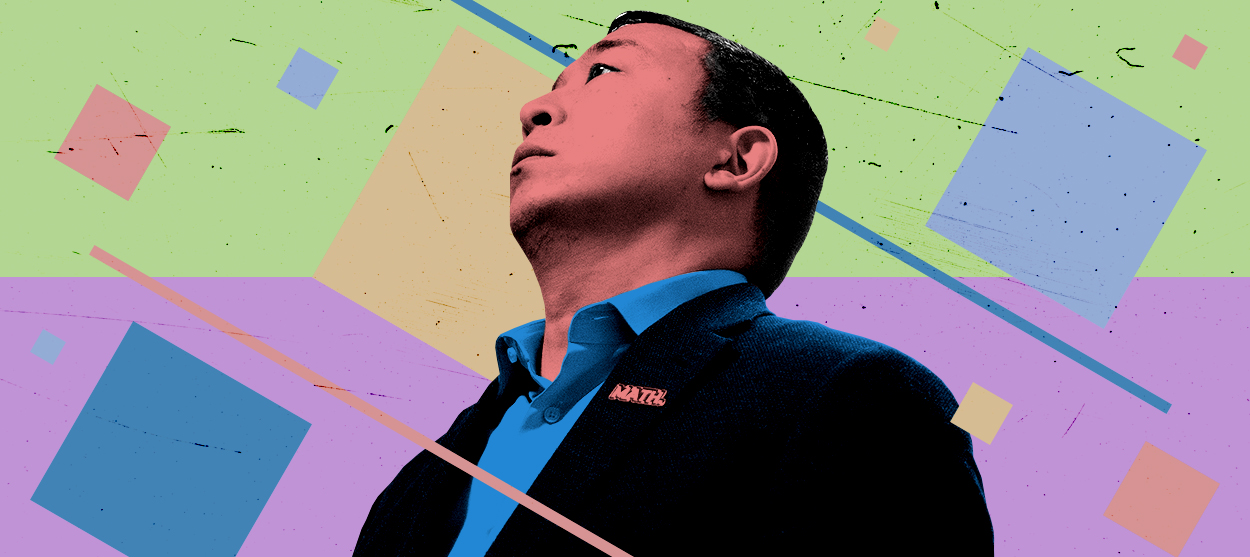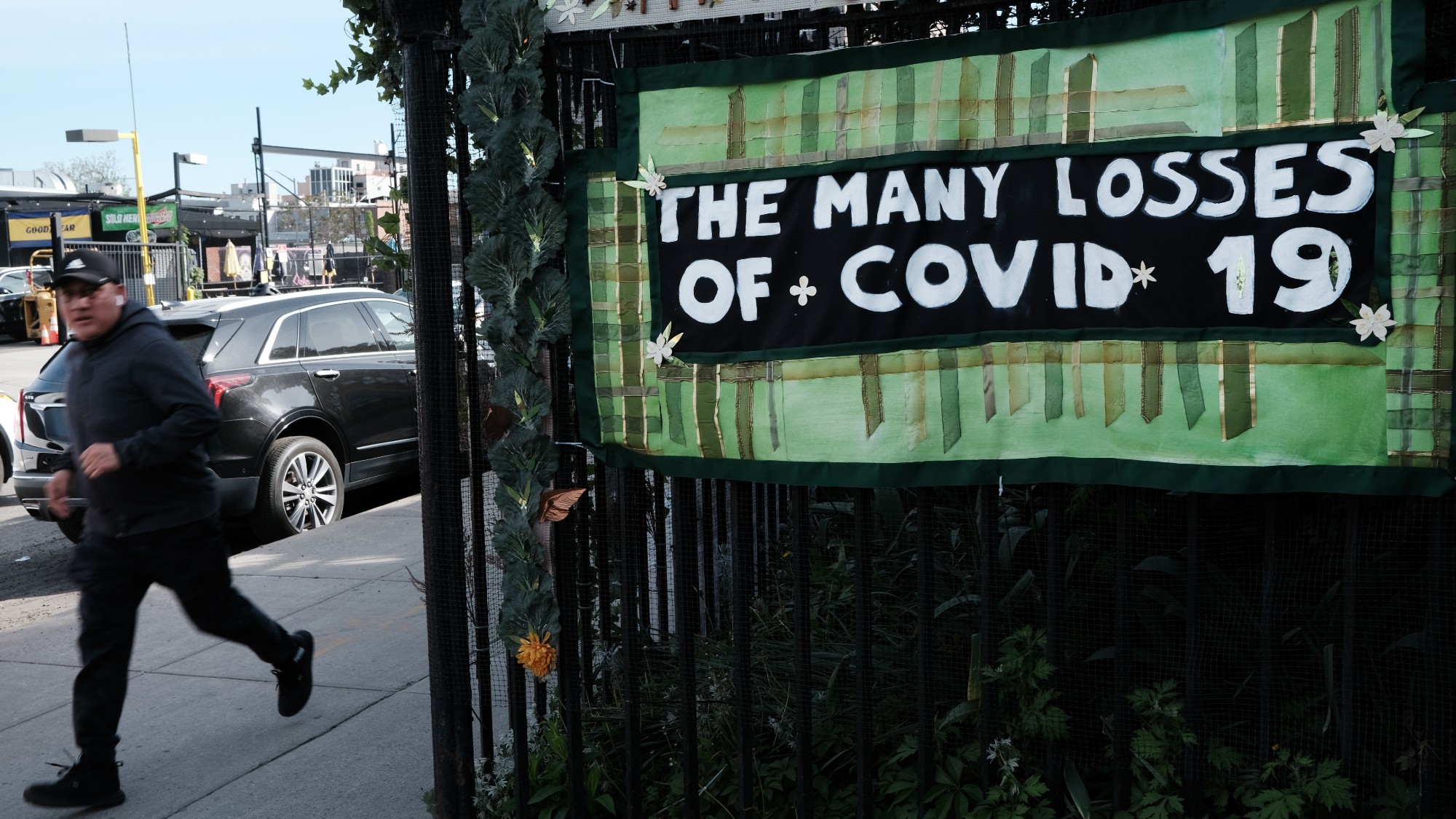Andrew Yang is right about coronavirus
Universal basic income is the best economic response to the crisis


A free daily email with the biggest news stories of the day – and the best features from TheWeek.com
You are now subscribed
Your newsletter sign-up was successful
Before Andrew Yang dropped out of the Democratic presidential primary back in mid-February, he built his campaign around one central proposal: a universal basic income (UBI). Essentially, it was a no-strings-attached check that would go out monthly to every adult in America, the same amount for everybody, regardless of their employment situation or income level or anything else.
Yang's big idea didn't win him the Democratic nomination, and the way he pitched it came with a few problems. But Yang's UBI might be just the thing we need in terms of an economic response to the coronavirus.
"Lower interest rates do nothing for the wage worker losing shifts and tips, for the mom stuck at home looking after her child because the school closed, for the restaurant or theater losing business because people are staying in," Yang noted yesterday on Twitter. "The only stimulus that would work is #UBIStimulus." Saying it's the “only stimulus that would work” goes a little far. But basically Yang is right: The coronavirus is a unique kind of economic shock that limits the effectiveness of traditional stimuli, such as infrastructure spending, public works, and interest rate cuts (which the Federal Reserve just tried). But coronavirus is also a unique economic shock to which UBI's strengths are particularly well suited. And understanding why that is can help us structure the rest of our economic response as well.
The Week
Escape your echo chamber. Get the facts behind the news, plus analysis from multiple perspectives.

Sign up for The Week's Free Newsletters
From our morning news briefing to a weekly Good News Newsletter, get the best of The Week delivered directly to your inbox.
From our morning news briefing to a weekly Good News Newsletter, get the best of The Week delivered directly to your inbox.
In a classical recession, workers are still available to work, and the factories can still run, but the money to employ them simply isn't there. That means there are lots of options for re-employing those resources, from direct cash aid to infrastructure projects to public works and other public investments. But when you're talking about quarantines and economic shutdowns from a disease outbreak like COVID-19, the situation is entirely different: By definition, the workers affected can't go back on the job, and factories need to stay shuttered to prevent spreading the infection.
Of course, this means any stimulus will be of limited help. We can't prevent economic damage from a coronavirus outbreak — we can only mitigate it. But some forms of stimulus will also do that much better than others: Passing a big infrastructure bill can't re-employ the workers under quarantine, for instance. And you never know when the workers you have re-employed with your public works might all get sick.
What you need is a form of stimulus that's maximally flexible and adaptable — and there's nothing more flexible and adaptable that straight cash handed out to citizens. It will boost demand going to the parts of the economy that are still functioning, and that have lost demand from the parts that have shut down. And as Yang argued, it will also support people who are quarantined and aren't working, but who still need to buy essentials (the quarantines we've been seeing around the world still allow people minimum travel to buy essentials, or shipping to bring in essentials ordered online).
Another thing is that low-income Americans will be the hardest hit by coronavirus. They're the least likely to have paid sick leave, they're disproportionately employed in industries like food service and retail where working from home simply isn't an option, and they tend to be the workers first hit when the economy sheds jobs in any form of recession. This also means low-income workers will provide the biggest stimulus bang-for-the-buck, turning around and immediately spending most of the money they get back into the economy.
A free daily email with the biggest news stories of the day – and the best features from TheWeek.com
Now, you might think this point would also call for more targeted cash handouts to less fortunate Americans specifically. But as Josh Bivens at the Economic Policy Institute pointed out, another critical part of a stimulus response to coronavirus will be speed. Income tests introduce bureaucracy, which will slow the program down. Simply handing out the same amount of money to everybody may be less focused, but it makes things as simple and fast as possible.
The good news is that, even though Yang had trouble pushing a UBI in the presidential debates, economists are catching on to the strengths of straight cash aid in this circumstance. Bivens recommends it, as does Jay Shambaugh, the director of the centrist Hamilton Project at the Brookings Institution. Jason Furman, formerly the chief economic advisor to President Obama, just called for "a simple one-time payment of $1,000 to every adult who is a U.S. citizen or a taxpaying U.S. resident, and $500 to every child who meets the same criteria," with automatic triggers to extend the payments if economic conditions worsen.
As I mentioned, we can also use this same logic to spell out other policies well suited to a COVID-19 economic shock. An obvious one is increasing unemployment aid: The federal government can pump extra money into state unemployment insurance systems, allowing them to expand benefits and eligibility. We should also try to get a federally-funded program for paid sick leave off the ground, so all workers can have it no matter what sector they're in. The White House has been gravitating towards tax cuts — both a payroll tax reduction and tax relief for hard-hit businesses. But a tax cut's ability to aid a business falls as its revenue falls; a better way to help companies weather the downturn is to make borrowing cheaper, which the Federal Reserve already did. (And even that can only tide the business over so long.) Finally, while a payroll tax cut will certainly offer much more help to average people than business tax cuts, Furman notes it would still disproportionately help the well-off compared to simple cash giveaways.
Bivens also listed some other things to focus on: State budgets tend to make recessions worse, because they have to cut spending to match falling tax revenue. The federal government can prevent that by giving states money directly, and by paying states' share of Medicaid expenses — also useful since making health care as accessible and affordable as possible is crucial in a major viral outbreak. The federal government ought to also reimburse hospitals for all coronavirus-related expenses, make testing free, and spend whatever's necessary to bulk up the country's public health resources specifically.
Of course, the other thing the coronavirus is revealing is that a lot of these policies should've already been permanent anyway — in particular, think of national paid sick leave, or universal health coverage for all Americans. And who knows: Should we pass a temporary UBI to fight a coronavirus recession, we might discover it's also the sort of program we ought to keep around.
Jeff Spross was the economics and business correspondent at TheWeek.com. He was previously a reporter at ThinkProgress.
-
 Can foster care overhaul stop ‘exodus’ of carers?
Can foster care overhaul stop ‘exodus’ of carers?Today’s Big Question Government announces plans to modernise ‘broken’ system and recruit more carers, but fostering remains unevenly paid and highly stressful
-
 6 exquisite homes with vast acreage
6 exquisite homes with vast acreageFeature Featuring an off-the-grid contemporary home in New Mexico and lakefront farmhouse in Massachusetts
-
 Film reviews: ‘Wuthering Heights,’ ‘Good Luck, Have Fun, Don’t Die,’ and ‘Sirat’
Film reviews: ‘Wuthering Heights,’ ‘Good Luck, Have Fun, Don’t Die,’ and ‘Sirat’Feature An inconvenient love torments a would-be couple, a gonzo time traveler seeks to save humanity from AI, and a father’s desperate search goes deeply sideways
-
 The billionaires’ wealth tax: a catastrophe for California?
The billionaires’ wealth tax: a catastrophe for California?Talking Point Peter Thiel and Larry Page preparing to change state residency
-
 Bari Weiss’ ‘60 Minutes’ scandal is about more than one report
Bari Weiss’ ‘60 Minutes’ scandal is about more than one reportIN THE SPOTLIGHT By blocking an approved segment on a controversial prison holding US deportees in El Salvador, the editor-in-chief of CBS News has become the main story
-
 Has Zohran Mamdani shown the Democrats how to win again?
Has Zohran Mamdani shown the Democrats how to win again?Today’s Big Question New York City mayoral election touted as victory for left-wing populists but moderate centrist wins elsewhere present more complex path for Democratic Party
-
 Millions turn out for anti-Trump ‘No Kings’ rallies
Millions turn out for anti-Trump ‘No Kings’ ralliesSpeed Read An estimated 7 million people participated, 2 million more than at the first ‘No Kings’ protest in June
-
 Ghislaine Maxwell: angling for a Trump pardon
Ghislaine Maxwell: angling for a Trump pardonTalking Point Convicted sex trafficker's testimony could shed new light on president's links to Jeffrey Epstein
-
 The last words and final moments of 40 presidents
The last words and final moments of 40 presidentsThe Explainer Some are eloquent quotes worthy of the holders of the highest office in the nation, and others... aren't
-
 The JFK files: the truth at last?
The JFK files: the truth at last?In The Spotlight More than 64,000 previously classified documents relating the 1963 assassination of John F. Kennedy have been released by the Trump administration
-
 'There is a certain kind of strength in refusing to concede error'
'There is a certain kind of strength in refusing to concede error'instant opinion 'Opinion, comment and editorials of the day'
